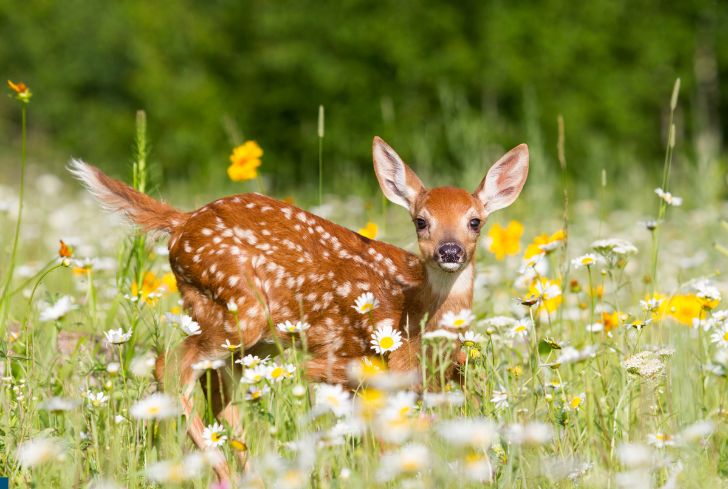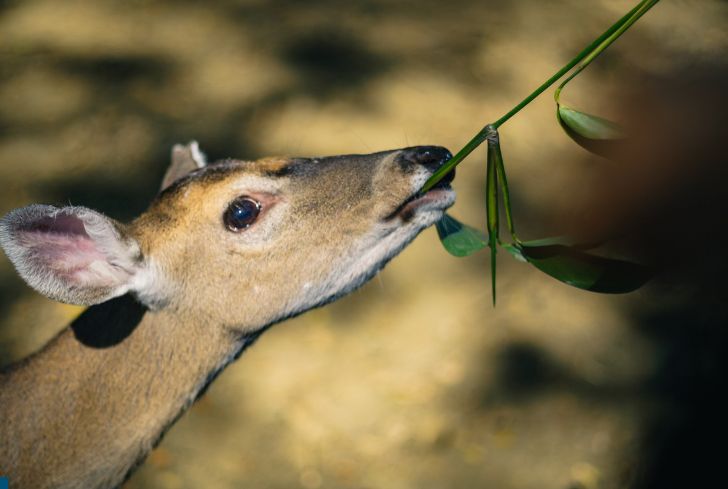Geranium is an all-time favorite flowering plant for gardeners. These flowers are easy to grow & maintain and will often leave your garden with a colorful look & a pleasant smell. Furthermore, it is an attractive plant that can occasionally be a delicacy for deer.
Geraniums can be grown as houseplants (in late summer and early spring) and outdoors (in warmer months). So, a gardener wouldn’t want deer to spoil a garden full of Geraniums.
But will deer eat Geraniums? Well, you are about to find out shortly.
Let’s find out more about Geraniums and deer relation, and how to stop them from eating these flowering plants in the garden.
Are Geraniums Deer Resistant?
Well, Geranium is not a deer’s number one food choice. These omnivores find these flowering plants strong-smelling, bitter with a fuzzy texture, and toxic. Though, they will occasionally eat Geranium when there is a shortage of food. But remember that deer eat almost anything with flowers, including strawberries, tulips, and hostas.
There are a few occasions when they might consume this flowering plant – and Geraniums are not deer resistant.
In the warmer months when most plants have shoot, deer will keep off Geraniums because of their pungent smell. Geraniums will be considered deer-resistant by most gardeners during this particular season.
Note that deer-resisting plants have a strong taste, overpowering smell, and fuzzy leaves. Hence, it is a good idea to protect your garden if you live in an area where a lot of deer are present. But then again, finding the precise all-year deer-resting plant can be challenging.
Today, gardeners use Geraniums as a deer-resistant plant. But there is no solid proof that these flowering plants are 100% deer resistant, even as much as people use them as deer-resistant plants.
Deer are usually attracted to green gardens, even with Geraniums present. Moreover, you cannot use Geraniums as deer-resisting plants in the cold season because, during this time, most plants have produced flowers.
Why Do Deer Eat Geraniums?
There is a food shortage during the colder months (October to February). So, deer will find Geraniums a delicacy and avoid starving as well.
Remember that Geraniums usually thrive better in the cold seasons, low temperatures, and high rainfall – meaning that there will be plenty of these flowering plants in the garden. In warmer months, however, deer will have other plant options.
Deer are herbivores and will often consume plants, shrubs, and flowers. Geraniums are flowering plants that grow together with other plants. Hence, they are susceptible to deer feasting at some point.
Clever Ways to Keep Deer Away From Geraniums
There are effective methods like using a fence, motion-activated sprinklers, and repellants most gardeners use to keep deer away from eating Geraniums. Unfortunately, some of these techniques are not 100% recommended, but worth trying if you want to save your garden plants.
Tip: You should use the most effective technique in your garden from the methods discussed below. Fortunately, these strategies can be used in cold seasons when deer are likely to damage your garden.
1. Fencing
Fencing your garden is among the most effective methods of keeping deer away from your Geraniums. Fences will create a barrier that discourages deer from trespassing into your home. You can use the black mesh 8ft tall metal t-bar garden posts, electric, or wooden fences (depending on your preference).
Remember: Always make the post high enough (probably 8 feet tall) because deer are known to be good jumpers and can comfortably jump 6ft.
2. Using Repellents
Always use reliable repellents or homemade DIY repellents. But make sure the deer repellent is safe before buying it.
For DIY repellants, mix 2 eggs, hot sauce, garlic, and 2 cups of soap water and leave it overnight. Spray the entire flower bed without missing a single spot.
3. Surround with other plants
Use toxic or deer-resistant flowers like sage, peonies, and irises to surround the garden or even plant them together with your Geraniums.
Tip: Always ensure that the plants are toxic enough or have a pungent smell to discourage deer from eating or coming close to the area . Sage, mint, basil, and lavender are a few pungent smells that deer don’t like.
4. Using auto-activated sprinkles
Install motion-sensor sprinklers inside or close to the garden so that when a deer comes close to or inside the garden, they will be activated and discourage the deer from moving closer.
Tip: The sprinkles should be close to the flower bed rather than inside the flower bed.
5. Using visually unappealing techniques
An attractive or colorful garden with fruits and flowering plants is appealing to deer. But changing the landscape or reducing deer-eating plants will help solve this situation.
You can also try other methods like using a white flag that is visually unappealing to a deer or spreading dog hair close to the flower bed to make it unattractive and scare them away.

Which are Other Deer Repelling Plants?
As discussed above, deer are not attracted to plants with strong/pungent smells or bitter-tasting herbs. Flowers with bitter taste are toxic and might affect deer digestion or cause sickness.
Remember that deer have sensitive noses. So they can smell objects from a far distance. Strong-scented plants like lavender and mint will keep them away from the site. Also, bitter-tasting herbs like daffodils and foxglove are discouraging to them.
Other deer repelling plants include but are not limited to Lamb’s ear, Bleeding heart, Russian sage, Marigolds, Cardinal flower, Oregano, and Iris.
According to research, not all of the above-mentioned plants are 100% deer resistant. Like Geraniums, deer might still feed on them eventually when food is scarce in the wild.
Will Geraniums Come Back After Deer Eat Them?
This depends on the type of Geranium. Geraniums can come back even after deer feasting. However, a Geranium growing back will predominantly depend on the extent of the damage.
Perennial and Pelargonium are the two most common Geranium gardeners like to grow. Perennial Geraniums are likely to die after an extensive deer attack; but will regrow if the damage is not intense. Pelargoniums can withstand severe feasting. These Geranium species sprout better and more beautiful after extensive trimming.
Pro Tip: Always prevent Geranium garden attacks from deer using any of the above-discussed methods. Furthermore, use fertilizers to boost Geranium growth.
Do Raccoons Eat Geraniums?
Raccoons do not like Geraniums. But they will feed on them when there is a shortage of food. Note that raccoons eat almost anything and everything on their path. Hence, if you have Geraniums in your yard, you should always protect them from raccoons. The strong scent of Geraniums (even from far) usually attracts these omnivores.
Raccoons are savage eaters and feed on anything in the trash can and garden. However, they do not like the bitter taste of Geraniums.
Which Other Animals Eat Geraniums, and How to Keep Them Away?
Deer are not the only animals you should be worried about eating your Geraniums in the garden. Other animals like Geranium budworms, pervasive caterpillars, rats, birds, and insects (like butterflies, mites, and aphids) will eat and destroy Geraniums.
Birds, however, do not eat the entire plant but suck nectar from the flowers. Rats will damage Geraniums extensively by feeding on the flowers and buds. Budworms will bore holes in the Geranium’s stem, branches, leaves, and buds.
Fortunately, you can use the same deer-resistant techniques to prevent these other pests from feeding Geraniums in your garden.
The most effective techniques include using repellents, dogs, and a fence. Using traps for rodents can also work effectively. Using Miniature scarecrows will also keep birds away from your garden. Introducing “insect predators” like ladybugs in your garden will help to deal with aphid invasion. But remember that the predators you bring in the garden should not feed on the Geraniums.
Using Insecticide soap or fertilizers might also help to reduce insect infestation in the garden. Though, it depends on the problem you are facing.
Conclusion
Geraniums are beautiful and colorful plants that improve the look and smell of a garden. Not to mention, these plants have citrus and fruity accent. A few others assume a spicy rose scent.
Unfortunately, Geraniums are susceptible to attacks by herbivorous and omnivorous mammals due to their scent. Hungry pests and insects also pose a nuisance to Geraniums. Thus, you need to understand how to deal with predators affecting Geranium growth in your garden using the above-discussed methods.
Lastly, remember that Geraniums are not 100% deer resistant, and you should never take chances and leave your garden unattended.






